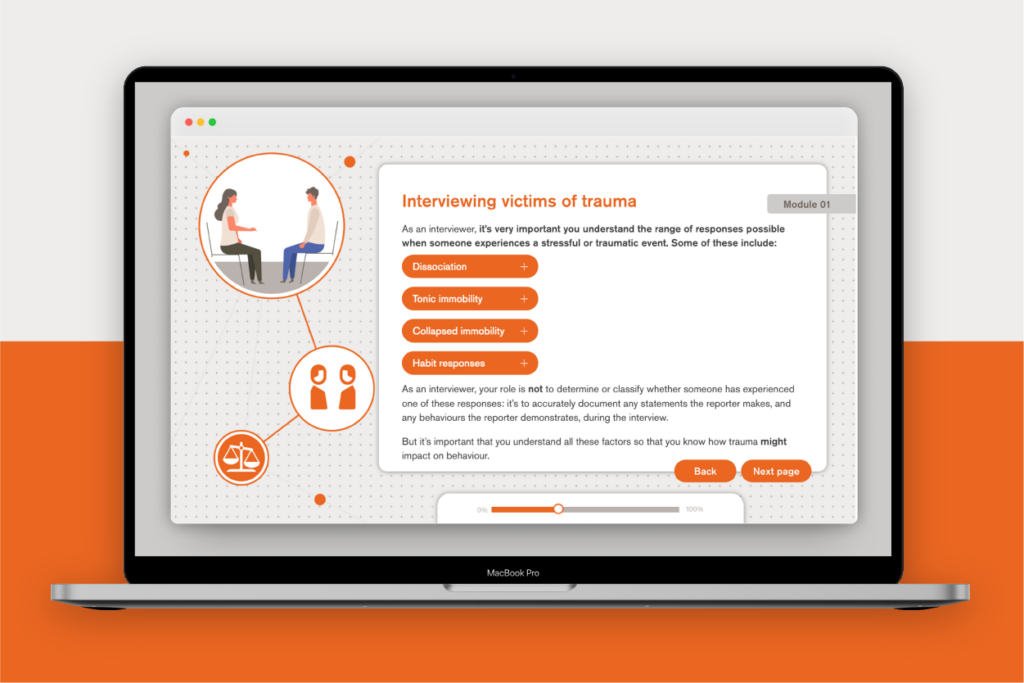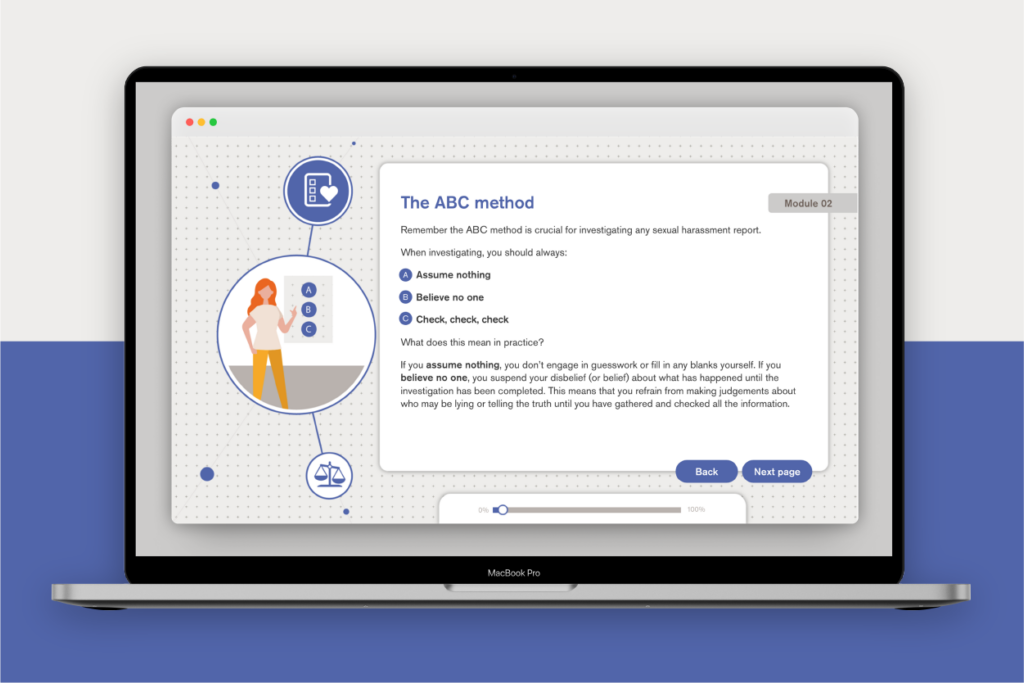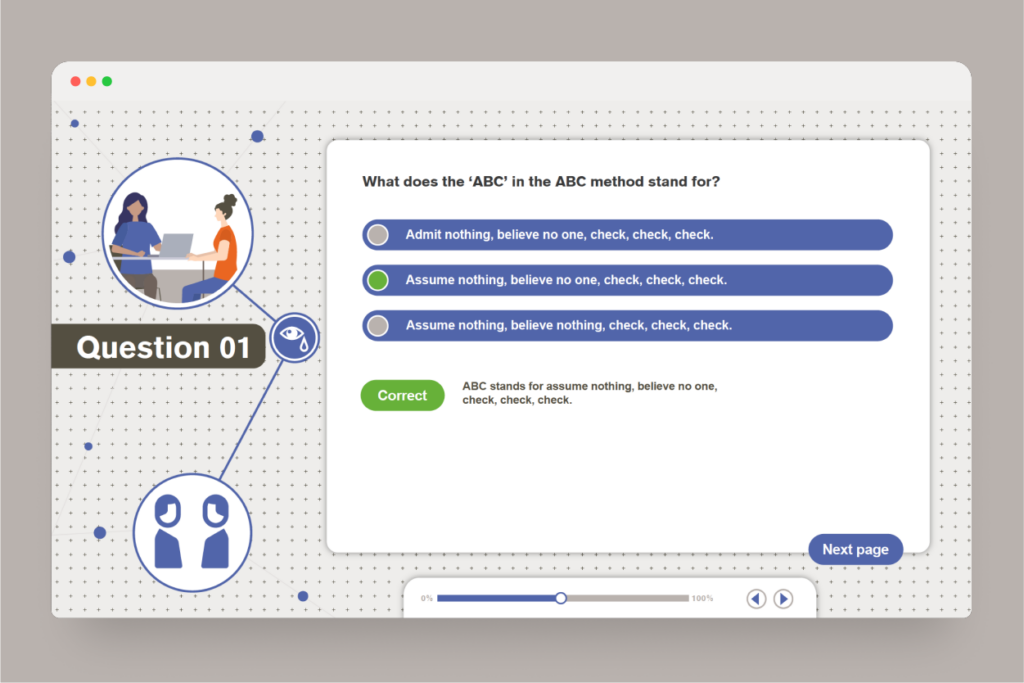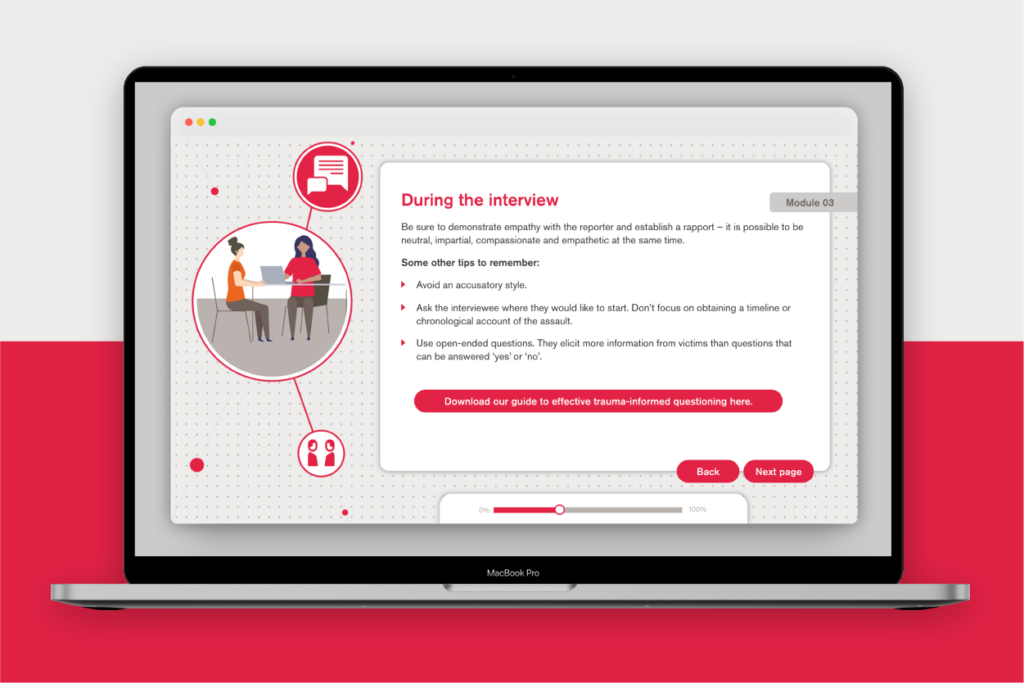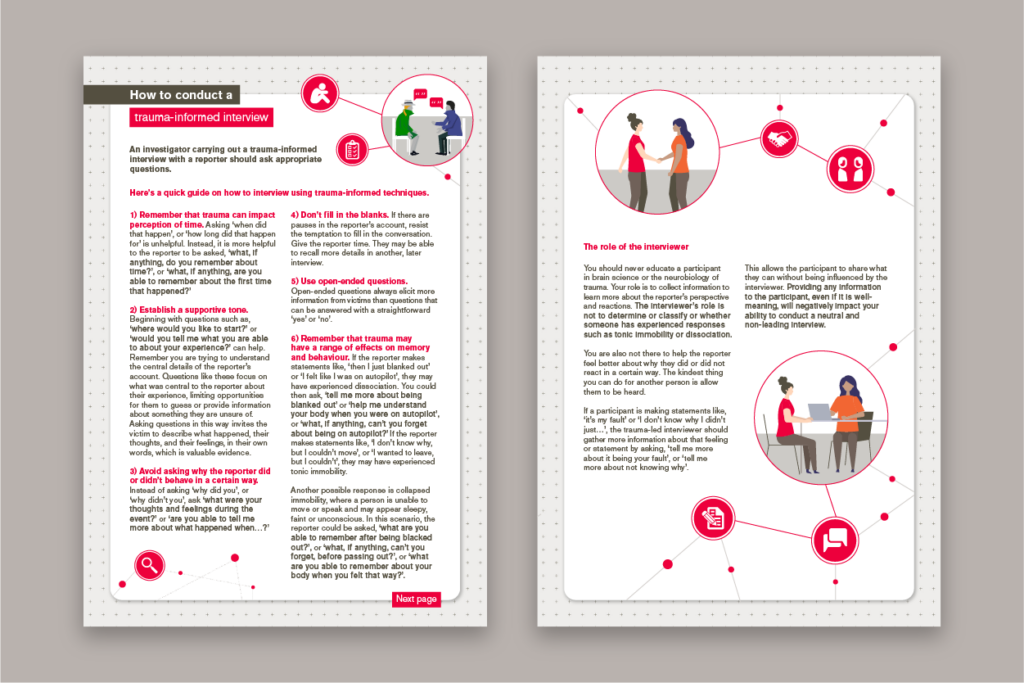Blended learning for sexual harassment investigators
at a global pharmaceutical
The problem
Science tells us that memories are much more mutable than we’d like to think. They’re not as fixed as, say, a photo, or a recording on your mobile phone.
And memories can become especially jumbled after times of trauma. Stress makes the mind and body work in unusual ways: traumatic events aren’t always captured in a coherent, chronological, pin-pointedly-accurate fashion.
This means you need a cool head to investigate instances of sexual harassment or assault in the workplace. You also need consistency, compassion and composure, as interviews and investigations need to be conducted in a way that is fair to all parties. After all, the most critical component of any case is often a detailed interview with those reporting an allegation.
So, becoming familiar with recent developments in the neuroscience of trauma and stress, and the effect they have on the brain and the memories it makes, is a must.
The brief
How could we refine existing learning materials – as well as research and identify new information – to create a course that would see the investigations team:
- update their skills,
- become more accustomed with the impact of trauma on the brain,
- and run better informed sexual harassment cases?
Blended learning for sexual harassment investigators
at a global pharmaceutical
The problem
Science tells us that memories are much more mutable than we’d like to think. They’re not as fixed as, say, a photo, or a recording on your mobile phone.
And memories can become especially jumbled after times of trauma. Stress makes the mind and body work in unusual ways: traumatic events aren’t always captured in a coherent, chronological, pin-pointedly-accurate fashion.
This means you need a cool head to investigate instances of sexual harassment or assault in the workplace. You also need consistency, compassion and composure, as interviews and investigations need to be conducted in a way that is fair to all parties. After all, the most critical component of any case is often a detailed interview with those reporting an allegation.
So, becoming familiar with recent developments in the neuroscience of trauma and stress, and the effect they have on the brain and the memories it makes, is a must.
The brief
How could we refine existing learning materials – as well as research and identify new information – to create a course that would see the investigations team:
- update their skills,
- become more accustomed with the impact of trauma on the brain,
- and run better informed sexual harassment cases?
Clips from the animations we delivered
Brand led concepts // E-learning design & Development // Scripts // Illustrations // Animations // Guidance



What we did
First, we combed through acres of internal material and made mountains of notes. Next, we put on our academic hats, took a deep breath, and dug deep into the neuroscience of trauma.
This meant bags of reading and research until our printers packed up, our eyes blurred and our brains pleaded with us to take a break. (We promised them we would, then ploughed on until we were fully up to speed on the science surrounding trauma and memory.)
It also meant liaising with a group of experienced internal experts on the most effective ways of conducting trauma-informed interviews.
Then, and only then, was it time to build a course.
We crunched our bulging files, careworn notebooks and deep-into-the-night discussions into three snappy, self-directed modules.
Module 1 looked at our new scientific understanding of the variety of ways the body and brain can behave during and after a traumatic event. It also explored how memories are created and the effect stress and trauma can have on them.
Module 2 was more specific to this particular client and focussed on planning an investigation, how best to manage a reporter and reported party, and how to deal with the outcomes of an investigation.
Module 3 sought to better prepare investigators for interviews, alongside refining methods of trauma-informed questioning.
For each module, the bulk of the information sat in the middle section. This was bookended with an animated, narrated overview and a multiple-choice test. In effect the team of investigators would:
- Be introduced to the material;
- Go over the material in greater depth; and then
- Test their knowledge.
This online training was combined with three live masterclasses led by the organisation’s head investigator. These sessions allowed participants to discuss any concerns, go through real-life scenarios and even practice interview scenarios with actors.
Some highlights from the courses and masterclasses
Why it worked
The Behavioural Science
Spacing effect
Want people to remember new material?
Space. It. Out.
And repeat, repeat, repeat – both over time and across environments. Not only did each of the three modules reiterate the most important concepts about trauma and interviewing, the masterclasses provided a different way of learning the same things a bit further down the track.
We also started in module one with new information learners hadn’t ever seen before, to awaken their curiosity and to motivate them to keep going and fill in the gaps in their existing knowledge.
Messenger effect
The choice of who delivers a message can be as (or indeed more) important than what’s actually said. We’re more likely to absorb information coming from authority figures and those we feel positively about and less likely to take on board information from those who we don’t trust (or actively dislike).
The introduction of a masterclass hosted by the Head of Investigations both added credibility to the project and reinforced the content they had recently learned.
Feedback loops
Feedback loops are the basic mechanic underpinning how we learn, develop and grow. We tend to look for information that clarifies – or otherwise – our actions. Without feedback loops, we’re condemned to repeat the same mistakes over and over.
The interactivity of the masterclasses was important in providing real-time feedback on the questions and concerns of those on the course, positively reinforcing doing the right thing.
Why it worked
The Behavioural Science
Spacing effect
Want people to remember new material?
Space. It. Out.
And repeat, repeat, repeat – both over time and across environments. Not only did each of the three modules reiterate the most important concepts about trauma and interviewing, the masterclasses provided a different way of learning the same things a bit further down the track.
We also started in module one with new information learners hadn’t ever seen before, to awaken their curiosity and to motivate them to keep going and fill in the gaps in their existing knowledge.
Messenger effect
The choice of who delivers a message can be as (or indeed more) important than what’s actually said. We’re more likely to absorb information coming from authority figures and those we feel positively about and less likely to take on board information from those who we don’t trust (or actively dislike).
The introduction of a masterclass hosted by the Head of Investigations both added credibility to the project and reinforced the content they had recently learned.
Feedback loops
Feedback loops are the basic mechanic underpinning how we learn, develop and grow. We tend to look for information that clarifies – or otherwise – our actions. Without feedback loops, we’re condemned to repeat the same mistakes over and over.
The interactivity of the masterclasses was important in providing real-time feedback on the questions and concerns of those on the course, positively reinforcing doing the right thing.
The results
Clearly this was a sensitive project. And the nature of it meant that we never really expected to see a neatly-packaged set of results.
What we can say, from observing the process from beginning to end, is that the investigations team were animated and engaged throughout and were left with life-long learning. And the informal feedback we received – peppered with words and phrases like:
The results
Clearly this was a sensitive project. And the nature of it meant that we never really expected to see a neatly-packaged set of results.
What we can say, from observing the process from beginning to end, is that the investigations team were animated and engaged throughout and were left with life-long learning. And the informal feedback we received – peppered with words and phrases like:


